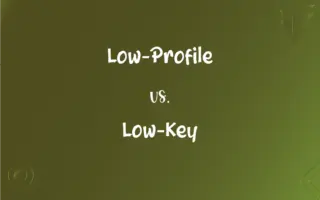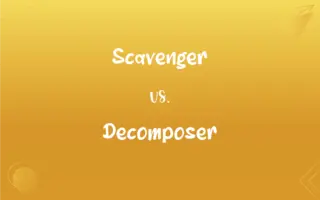Voyage vs. Journey: What's the Difference?
Edited by Aimie Carlson || By Janet White || Published on January 27, 2024
A voyage typically refers to a long journey involving travel by sea or in space, while a journey is a general term for traveling from one place to another, which can be by land, air, or sea.

Key Differences
A voyage is often used to describe a long journey involving travel over water or through space, usually emphasizing the means of travel like a ship or spacecraft. In contrast, a journey can refer to travel of any length and by any mode of transportation, including walking.
The term voyage carries a sense of adventure and exploration, often associated with discovery and long distances. A journey, however, is a broader term that encompasses all types of travel, from a short trip to a long expedition.
Voyages are historically significant, often linked to naval and space explorations. Journeys, on the other hand, can be mundane daily commutes or significant travels for personal, business, or leisure purposes.
In literature, a voyage often symbolizes a quest or a significant change, focusing on the experience of travel itself. A journey in literature can symbolize personal growth, a physical move from one place to another, or a metaphorical shift in understanding or perspective.
The word voyage is derived from Latin 'viaticum', suggesting a provision for traveling, indicative of longer and more substantial trips. Journey comes from the Old French 'jornee', meaning a day's travel or a day's work, reflecting its use for shorter or day-to-day travels.
ADVERTISEMENT
Comparison Chart
Typical Duration
Long-term, often weeks or months
Can vary from short trips to long travels
Mode of Transportation
Primarily by sea or space
Any mode, including walking, car, or plane
Connotation
Exploration, adventure, significant travels
General travel, personal growth
Historical Usage
Naval and space explorations
Broad usage, including daily commutes
Etymology
From Latin 'viaticum' for traveling provision
From Old French 'jornee' for a day's travel
ADVERTISEMENT
Voyage and Journey Definitions
Voyage
An extended travel experience, often for exploration or discovery.
Her voyage to Antarctica was a life-changing experience.
Journey
The act of traveling from one place to another.
Their journey across the country took three days.
Voyage
A journey in literature often representing adventure or quest.
The novel describes the protagonist's voyage to unknown lands.
Journey
A trip or movement from one location to another.
The morning journey to work was always hectic.
Voyage
A long journey involving travel by sea or in space.
The sailors embarked on a voyage across the Atlantic.
Journey
A metaphorical term for a process of change or development.
Her journey through college was challenging but rewarding.
Voyage
A term used in historical contexts for exploratory or trading missions.
The 15th-century voyages were crucial in mapping the world.
Journey
In literature, a symbol for personal growth or transformation.
The story depicted his journey from arrogance to humility.
Voyage
A metaphorical term for a significant life journey or experience.
His career was a voyage of personal and professional growth.
Journey
A term for a significant phase or period in life.
The journey of parenthood is filled with both joys and challenges.
Voyage
A long journey to a foreign or distant place, especially by sea.
Journey
The act of traveling from one place to another, especially when involving a considerable distance; a trip.
Voyage
Often voyages The events of a journey of exploration or discovery considered as material for a narrative.
Journey
A distance to be traveled or the time required for a trip
A 2,000-mile journey to the Pacific.
The three-day journey home.
FAQs
Can a journey be a short trip?
Yes, journeys can be short trips or extended travels.
Do voyages imply a sense of adventure?
Yes, voyages often carry connotations of adventure and exploration.
Are the terms voyage and journey interchangeable?
Not always, as voyage specifically implies longer, sea or space travel.
What is a journey?
A journey is the act of traveling from one place to another, regardless of distance or mode of transport.
Can a journey be a daily routine?
Yes, like a daily commute to work.
Are voyages always related to sea travel?
Primarily, but they can also refer to space exploration.
Do voyages have historical significance?
Yes, especially in the context of naval and space explorations.
What defines a voyage?
A voyage is a long journey typically by sea or in space.
Is a journey always physical?
No, it can also be metaphorical, representing personal growth.
What does journey originate from?
It originates from the Old French 'jornee', meaning a day's travel.
Can a journey be unplanned?
Yes, journeys can be both planned and spontaneous.
Are all long travels considered voyages?
No, only those that are primarily by sea or in space.
Are voyages common in modern times?
Yes, especially in the context of cruises and space missions.
Can a voyage be a part of a journey?
Yes, a voyage can be a segment of a longer journey.
Can a journey be emotional?
Yes, it can refer to an emotional or psychological journey.
Is a vacation considered a voyage?
Only if it involves long sea or space travel.
Can a journey be metaphorical in literature?
Yes, often symbolizing personal or spiritual growth.
Do journeys always have a destination?
Typically, but some journeys focus on the experience rather than the destination.
What is the origin of the word voyage?
It comes from the Latin 'viaticum', meaning traveling provision.
Is the journey important in storytelling?
Yes, it's often central to character development and plot progression.
About Author
Written by
Janet WhiteJanet White has been an esteemed writer and blogger for Difference Wiki. Holding a Master's degree in Science and Medical Journalism from the prestigious Boston University, she has consistently demonstrated her expertise and passion for her field. When she's not immersed in her work, Janet relishes her time exercising, delving into a good book, and cherishing moments with friends and family.
Edited by
Aimie CarlsonAimie Carlson, holding a master's degree in English literature, is a fervent English language enthusiast. She lends her writing talents to Difference Wiki, a prominent website that specializes in comparisons, offering readers insightful analyses that both captivate and inform.






































































